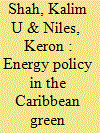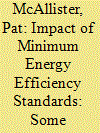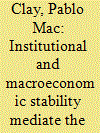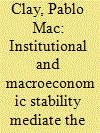|
|
|
Sort Order |
|
|
|
Items / Page
|
|
|
|
|
|
|
| Srl | Item |
| 1 |
ID:
186453


|
|
|
|
|
| Summary/Abstract |
There is increasing scientific evidence of anthropic climate change. The need to shift to more sustainable energy systems is therefore compelling. Individuals are becoming key actors in the energy transition, as producers and sellers of the renewable energy they produce on-site. However, the practice of self-consumption requires to be underpinned by adequate policy mechanisms. Under this perspective, the Spanish Royal Decree (RD) 900/2015, also so-called “Tax on the Sun”, aiming at regulating energy self-consumption and enhancing the engagement of Spanish citizens in the energy transition as prosumers, by the installation of photovoltaics, represents a challenging case study. There is anecdotal evidence that instead of supporting the diffusion of electricity self-consumption, the “Tax on the Sun” has had the opposite effect. Thus, this work aims at testing this proposition by using the synthetic control methodology (SCM), which permits to evaluate the effect of a treatment in absence of a suitable control group, as in this case. This study finds that indeed at the regional level the “Tax on the Sun” has had a negative impact, if any at all. The current barriers to prosumerism, and more broadly to the active involvement of citizens in the energy transition, are still many and policy-makers should address these shortcomings if they want to fully employ the potential that prosumerism has to offer to a just energy transition.
|
|
|
|
|
|
|
|
|
|
|
|
|
|
|
|
| 2 |
ID:
186872


|
|
|
|
|
| Summary/Abstract |
Despite the popularity of the Evidence-Based Policy Making paradigm, scholarly evidence often fails to have an impact in emotional or value-laden policy debates. Consequently, changes to Canada’s gun control laws in recent years have often failed to incorporate scholarly research. This is problematic given that the forces of path dependence impose costs on policy makers who seek to reverse established policies, even if they are dysfunctional. This article lays the theoretical foundations for a Firearms Policy Evaluation Framework, which can be used by scholars, policy makers, advocates, and the public to conduct preliminary evaluations of proposed firearms policies before they become law. The utility of the framework is then demonstrated with an evaluation of the 2020 assault-style weapons ban in Canada, which includes a systematic scoping review of the literature on the impact of assault-weapons bans.
|
|
|
|
|
|
|
|
|
|
|
|
|
|
|
|
| 3 |
ID:
184658


|
|
|
|
|
| Summary/Abstract |
The 2030 Agenda for Sustainable Development (Agenda 2030) encompasses social, economic, and environmental commitments within a single global framework. However, experts have been warning that the ambitious nature of Agenda 2030’s Sustainable Development Goals (SDG s) might be lost in indicator-driven implementation. This article examines the assumption that SDG indicators result in policy shrinking (offering a less ambitious framing) by exploring how the framing of Agenda 2030’s gender commitments shifts from SDG s to their indicators. Employing critical frame analysis, this article shows that SDG global indicators result in policy shrinking of gender-specific targets in terms of their 1) human rights framing 2) overall scope, and 3) inclusivity of target groups. This policy shrinking does not necessarily undermine Agenda 2030, but it does call for greater attention, especially by actors promoting gender equality, to national interpretations of specific SDG targets and the inclusivity of otherwise marginalized policy target groups.
|
|
|
|
|
|
|
|
|
|
|
|
|
|
|
|
| 4 |
ID:
186483


|
|
|
|
|
| Summary/Abstract |
The Tokyo emissions trading scheme (ETS) is the first regional ETS in Japan, where a national ETS has not been introduced. In this study, we estimate the policy impacts of the Tokyo ETS on energy usage and economic activities during the scheme’s first phase (2010–2014) and the first four years of its second phase (2015–2018) using business establishment-level panel data from 2007 to 2018. From the matching-based difference-in-differences (DID) estimation results, we find that while regulated business establishments reduced their energy usage beyond their reduction targets set by ETS regulation, the unregulated business establishments chosen by the matching strategy as a comparison group also decreased their energy usage to the same extent. Additionally, the Tokyo ETS did not have a negative impact on the economic activities of regulated business establishments during phases I and II. These results suggest that the emissions cap levels in each phase may not have been sufficiently demanding to induce regulated business establishments to implement additional energy use reduction practices.
|
|
|
|
|
|
|
|
|
|
|
|
|
|
|
|
| 5 |
ID:
149845


|
|
|
|
|
| Summary/Abstract |
Market integration efforts of Caribbean small island developing states have become transposed on the growing paradigm shift towards green economy pathways. Central to this is the challenge of implementing Caribbean energy policy in a manner that is aligned with green economy ideals and face the realities of regional indebtedness and environmental impacts. Here we analyze the current state of the Caribbean energy policy development arena and propose that the currently weak policy and institutional design regime might potentially benefit from the application of the Institutional Analysis and Design (IAD) model especially within the operational context of the green economy. It allows us to identify current policy dilemmas, bottlenecks and discrepancies and to disentangle some of them while offering up a way forward with others. We do not so much offer distinct recommendations but focus more on delineating how to clear the pathway for sound policy intervention and outcomes. By doing so we set forth a challenging agenda for future policy analysis research that will advance Caribbean energy policy in more robust ways.
|
|
|
|
|
|
|
|
|
|
|
|
|
|
|
|
| 6 |
ID:
177311


|
|
|
|
|
| Summary/Abstract |
Since 1994, to overcome adoption barriers and promote new energy vehicles (NEVs), eight cities and one province in China have implemented a license plate quota policy for internal combustion engine vehicles (ICEVs). We use a city-level dataset of NEV sales to assess the impact of license plate quota policy for ICEVs on the adoption of NEVs, by using both the synthetic control method (SCM) and difference-in-differences (DID) method for the first time. We find that license plate quota policy can significantly increase the annual sales of NEVs in Tianjin, Hangzhou, Shenzhen, and Haikou by approximately 73.4%, 87.5%, 87%, and 65.5% of total sales of NEVs, which is equivalent to increasing the annual sales of NEVs by 15,557, 22,267, 37,455, and 448 vehicles, respectively. Further, our findings indicate that a license plate quota policy for ICEVs promotes the adoption of NEVs but has certain limitations, for example, license plate quota policy has a short-term inhibitory effect on the regional auto industry. Moreover, due to the restraint on consumers from purchasing ICEVs, consumers have certain negative sentiment toward the policy based on text analysis. Regions where license plate quota policy is adopted generally required well-developed public transportation and adequate charging infrastructures.
|
|
|
|
|
|
|
|
|
|
|
|
|
|
|
|
| 7 |
ID:
176813


|
|
|
|
|
| Summary/Abstract |
Previous studies analyzing energy related nitrous oxides (NOx) focus on the calculation and influencing factors of NOx generation, but lack sufficient analysis of policy impacts. This paper attempts to evaluate a critical financial incentive for motivating NOx removal in China – the denitrification tariff for power plants. We calculate energy-related NOx generation in 30 provinces from 1995 to 2016, and test the impact of the denitrification tariff using an extended STIRPAT (Stochastic Impacts by Regression on Population, Affluence, and Technology) model. We examine policy impacts in the pilot and follower regions with different implementation time, and find significant reduction in NOx generation in both regions. On national average, our model estimates that 1% increase in the denitrification tariff leads to 0.190% decline in energy-related NOx generation, holding other variables constant. The effect size of the tariff is higher in the follower region than in the pilot region, whereas policy effect is lagged for 2 years in the pilot region. We also find socio-economic factors significantly positively correlated with NOx generation. The result suggests that tailored incentives considering regional disparities will work better than a uniform incentive, and a combination of policy instruments in reducing fossil fuel consumption is desired to effectively reduce NOx generation.
|
|
|
|
|
|
|
|
|
|
|
|
|
|
|
|
| 8 |
ID:
178631


|
|
|
|
|
| Summary/Abstract |
Conscription typically involves migration to the duty base location. According to DaVanzo’s theory of repeat migration, this military-motivated migration might foster post-military migration. This paper investigates this issue empirically using individual-level data drawn from the 1992, 1998, and 2001 editions of the French survey of labor market entrants ‘Génération.’ The methods used to identify the causal effect of compulsory peacetime conscription on the post-military propensity to migrate exploit the abolition of conscription in France in October 1997 plus information on the timing of service among those who served. Conscription stimulated the post-military propensity to migrate for work of French male labor-market entrants with upper-class origins. Furthermore, there is evidence of a previously overlooked anticipatory effect of conscription: French males who were waiting to be called up for military service were approximately 25% less likely to migrate for work than comparable non-conscripts. Some implications of these findings and a consideration of their external validity are also provided.
|
|
|
|
|
|
|
|
|
|
|
|
|
|
|
|
| 9 |
ID:
137699


|
|
|
|
|
| Summary/Abstract |
This study investigates CO2 emission reduction within the EU resulting from the Emissions Trading Scheme (ETS) up to 2030. This is performed by constructing a baseline scenario without the ETS and assessing the impacts of the ETS, as currently designed. The results indicate that the ETS will start to impact emissions primarily after 2025 due to the prevalence of a sizable allowance surplus. The impact of approved (i.e. back-loading and 2.2% linear reduction factor (LRF)) and proposed (i.e. market stability reserve (MSR)) policy interventions and the inclusion of aviation,could accelerate the exhaustion of surplus and increase emission reductions during the investigated period. However, these measures would be insufficient to restore the scarcity of allowances and the corresponding carbon price before the start of ETS Phase IV, and the effectiveness of EU-internal abatement cannot be guaranteed until 2023. The effectiveness could be further reduced in the case of the economic shocks or the exclusion of international aviation. To restore the scarcity of allowances, other reform options are necessary. This paper extends the reasoning for the early removal of the back-loaded 900 Mtonne allowances by 2020 and broadening the scope of ETS to other sectors with potential high demand for allowances.
|
|
|
|
|
|
|
|
|
|
|
|
|
|
|
|
| 10 |
ID:
150644


|
|
|
|
|
| Summary/Abstract |
The German Energiewende envisages achieving a climate-neutral building stock in 2050 by means of two major pillars of regulation. First, residential buildings should consume 80% less primary energy and second; the remaining energy demand should be covered primarily with renewables. This paper simulates the future German heating market under different policy scenarios in order to evaluate the impact and limits of recent and conceivable policies. The investigation is based upon a dual model approach, linking a residential heating model to a discrete choice model. The major finding is that current regulations are not suitable for the achievement of governmental targets. Scenario calculations show that additional carbon emission reductions, triggered by the current regulatory regime, are falling short of expectations. In terms of economic efficiency, all calculated policy alternatives outperform the regulation currently in place. This allows to draw the conclusion that carbon emission reductions can be achieved without a major increase in cost. The model results highlight two policy implications. First, a rising mandatory share of renewables in the heating market is needed for target achievement and can be cost effectively. Second, renewable obligations for heating systems must include the existing building stock to achieve the postulated political targets.
|
|
|
|
|
|
|
|
|
|
|
|
|
|
|
|
| 11 |
ID:
177308


|
|
|
|
|
| Summary/Abstract |
In most countries, minimum energy performance standards (MEPS) and energy labels are the key policies to accelerate the diffusion of energy-efficient appliances and to help meet energy efficiency and climate policy targets. This paper estimates country-specific multivariate econometric models for eight EU countries over the period of 2007–2017 to evaluate the combined effects of changes in the MEPS and the energy labels entering into force in the EU in 2010 and 2011. The findings suggest that these policies increased the market share of cold appliances (refrigerators and fridge-freezer combinations) with an energy label of A+ and better between about 15 and 38 percentage points. For these appliances, autonomous developments (captured through a time trend) are estimated to range between 5 and 10 percentage points per year. Thus, failure to account for autonomous developments would have resulted in substantially overestimating the combined effects of MEPS and energy label policies in the EU. The findings further imply that policy evaluations should allow for policy effectiveness and autonomous developments to differ across countries.
|
|
|
|
|
|
|
|
|
|
|
|
|
|
|
|
| 12 |
ID:
183047


|
|
|
|
|
| Summary/Abstract |
This paper investigates the impact of the Swiss CO2 levy on households' heating demand. Using a difference-in-differences approach combined with inverse probability of treatment weighting, we test whether the 2016 and 2018 carbon tax rate increases had a short-run impact on Swiss households' heating and hot water expenditures—i.e. a proxy for heating consumption. Micro-level data from the Swiss Household Energy Demand Survey are used to estimate the models. Our regression analysis shows that heating consumption decreases with time for all households, but it does not detect any clear short-run impact of the CO2 levy on fossil fuel users in comparison to non-fossil fuel users. We nevertheless find that many factors significantly affect heating consumption, such as setting the thermostat at a lower temperature. Even though further research is needed regarding possible long-run impacts, our findings challenge the relevance of this policy instrument under its current form to lower households’ CO2 emissions. Considering that its rate is regularly increased based on short-run emission targets, households may have too little time to adapt. The tax design might thus need to be revised to take into account the slow reaction time.
|
|
|
|
|
|
|
|
|
|
|
|
|
|
|
|
| 13 |
ID:
166974


|
|
|
|
|
| Summary/Abstract |
This paper provides a preliminary evaluation of staged introduction of the Minimum Energy Efficiency Standards in England and Wales in the period after announcement but before policy implementation. A process evaluation of the specific policy design focussing on potential sources of policy failure is provided. Drawing upon a database of all EPCs registered for offices in London, preliminary empirical evidence is presented on policy outcomes post-announcement and pre-implementation period. The extent to which EPC G and F rated office buildings in London have improved their EPC rating in anticipation of the introduction of the policy between 2011 until 2017 is analysed. It is found that a maximum of 0.65% of the properties affected by the introduction of minimum standards had modifications that could have been triggered by the policy intervention in the period prior to policy implementation.
|
|
|
|
|
|
|
|
|
|
|
|
|
|
|
|
| 14 |
ID:
164701


|
|
|
|
|
| Summary/Abstract |
Most countries put significant amounts of time and effort in writing and issuing high-level policy documents. These are supposed to guide subsequent national defence efforts. But do they? And how do countries even try to ensure that they do? This paper reports on a benchmarking effort of how a few “best of breed” small- to medium-sized defence organisations (Australia, Canada, and New Zealand) deal with these issues. We find that most countries fail to link goals to resources and pay limited attention to specific and rigorous ex-ante or post-hoc evaluation, even when compared to their own national government-wide provisions. We do, however, observe a (modest) trend towards putting more specific goals and metrics in these documents that can be – and in a few rare cases were – tracked. The paper identifies 42 concrete policy “nuggets” – both “do’s and don’ts” – that should be of interest to most defence policy planning/analysis communities. It ends with two recommendations that are in line with recent broader (non-defence) scholarship on the policy formulation-policy implementation gap: to put more rigorous emphasis on implementation (especially on achieving desired policy effects), but to do so increasingly in more experiential (“design”) ways, rather than in industrial-age bureaucratic ones (“PPBS”-systems).
|
|
|
|
|
|
|
|
|
|
|
|
|
|
|
|
| 15 |
ID:
128157


|
|
|
|
|
| Publication |
2013.
|
| Summary/Abstract |
The paper offers an updated picture of the policies implemented by the government of the Guangdong Province (China) to foster the industrial development and the technological upgrading of its territories. Among these policies is the promotion and the institutional acknowledgement of a growing number of industrial clusters, defined as "Specialised Towns", characterized by a high spatial concentration of firms producing one specific item (or a limited range of similar products). In the view of the provincial and local governments these types of industrial development programs are used to increase firm agglomerations, spatial concentration and visibility, which in turn leads to increased specialisation, industrial output, innovation and economic growth. However, little specific empirical evidence has been collected to support this view and the debate, at the national and international level, on the effectiveness of such interventions seems to be still largely ideological. The paper offers a contribution in this sense by offering a detailed description of the policy tools, by suggesting synthetic indexes to quantify policy efforts and industrial performances in Guangdong territories and by providing a first statistical analysis of these indexes.
|
|
|
|
|
|
|
|
|
|
|
|
|
|
|
|
| 16 |
ID:
191375


|
|
|
|
|
| Summary/Abstract |
Renewable energy (RE) auctions have become an increasingly popular policy instrument for decarbonizing the global energy matrix, and have been rapidly adopted by several countries worldwide. Previous research has used data from higher-income countries and two-way fixed effects models to estimate the impact of auctions on RE capacity, mostly with favorable results. However, these studies did not account for heterogeneous treatment effects across units to explore whether auctions are also effective in countries with unstable business environments. We analyze whether auctions also foster RE in countries experiencing macroeconomic instability or poor institutional quality. For this purpose, this study has drawn from multiple publicly available databases to build a dataset comprising 98 countries from 2000 to 2020. Our definition of RE includes solar, wind, and biomass sources. We first cluster countries by the quality of their business environment and then perform a differences-in-differences analysis considering staggered treatment adoption. We find that auctions positively affect RE capacity, yet the average treatment effects are higher for countries with better business environments. Thus, governments should exercise caution in adopting this instrument, especially in countries that experience macroeconomic or institutional instability. At the same time, dynamic treatment effects suggest that the policy needs time to show results.
|
|
|
|
|
|
|
|
|
|
|
|
|
|
|
|
| 17 |
ID:
192770


|
|
|
|
|
| Summary/Abstract |
Renewable energy (RE) auctions have become an increasingly popular policy instrument for decarbonizing the global energy matrix, and have been rapidly adopted by several countries worldwide. Previous research has used data from higher-income countries and two-way fixed effects models to estimate the impact of auctions on RE capacity, mostly with favorable results. However, these studies did not account for heterogeneous treatment effects across units to explore whether auctions are also effective in countries with unstable business environments. We analyze whether auctions also foster RE in countries experiencing macroeconomic instability or poor institutional quality. For this purpose, this study has drawn from multiple publicly available databases to build a dataset comprising 98 countries from 2000 to 2020. Our definition of RE includes solar, wind, and biomass sources. We first cluster countries by the quality of their business environment and then perform a differences-in-differences analysis considering staggered treatment adoption. We find that auctions positively affect RE capacity, yet the average treatment effects are higher for countries with better business environments. Thus, governments should exercise caution in adopting this instrument, especially in countries that experience macroeconomic or institutional instability. At the same time, dynamic treatment effects suggest that the policy needs time to show results.
|
|
|
|
|
|
|
|
|
|
|
|
|
|
|
|
| 18 |
ID:
150445


|
|
|
|
|
| Summary/Abstract |
The enactment of the Energy Concept by the German Government in 2010 set ambitious targets for the future energy transition in Germany. The most prominent goals include a greenhouse gas (GHG) emission reduction of the economy and an increase in the share of renewable energy in the whole energy sector. Since the long run effects of these policy measures are hard to assess, science-based policy evaluation methods are needed to identify weak points and areas with a need for action. This paper presents the results of the German Energy Reference Forecast with a focus on the electricity sector. It is based on an investment and dispatch model for the European electricity sector over the planning horizon of the ‘Energiewende’ up to 2050, with an emphasis on the time period up to 2030. We find that almost all targets of the German ‘Energiewende’ are not reached, for the case in which no further measures are undertaken. In particular reductions in GHG emissions fall short to the target value. Contrary to the negative results, e.g., regarding GHG-emissions as well as gross electricity consumption, generation from renewable energy sources will exceed the policy's target value.
|
|
|
|
|
|
|
|
|
|
|
|
|
|
|
|
| 19 |
ID:
150701


|
|
|
|
|
| Summary/Abstract |
Many countries have implemented various policies for renewable energy development ranging from setting power purchase agreements and the legislation of renewable energy requirements to providing incentives and imposing carbon taxes. The evaluation of the effectiveness of such policies, however, is fragmented, which raises a need for a comprehensive analysis. This paper aims to assess whether and how policies promoting renewable energy investment have achieved the intended goals. It employs five broadly defined criteria - market, uncertainty, profitability, technology, and financial resources - to build an index to assess respectively if such policies have helped create a market for renewable energy, maximize potential profits, reduce risks relating to the investment, develop and adopt new technologies, and improve the access to financial resources. Each criterion is reflected by three indicators. Values of each indicator are converted into ordinal values for analysis. The index not only scans comprehensively all relevant renewable energy investment policies in the East Asia Summit countries, but also provides systematic and quantitative measures to compare the effectiveness of policies in these countries with respect to the creation of market, the degree of uncertainty, the potential of profitability, the development and adoption of technology and the accessibility of financial resources.
|
|
|
|
|
|
|
|
|
|
|
|
|
|
|
|
| 20 |
ID:
179732


|
|
|
|
|
| Summary/Abstract |
We explore the potential role of road pricing in achieving deep GHG mitigation targets, including cordon zones, fuel taxes, VKT fees, and ZEV zones. While most research focuses on a single policy criterion, our comprehensive framework seeks to synthesize insights on five criteria: effectiveness (GHG mitigation), efficiency, equity, political acceptability, and implementation process. Further, we address potential policy mix interactions, and identify critical gaps to guide future research. Although results vary by region, we offer some general findings. First, stringent road pricing can be effective for GHG mitigation in the short- and long-run, especially for passenger vehicles (less so for freight), while also playing a complementary role to vehicle efficiency regulations (mitigating rebound effects). Second, both equity and political acceptability can be improved by careful design of exemptions and usage of revenues – though the ideal design seems to vary considerably by region. Finally, the implementation process is highly important for acceptability, which should include stakeholder consultation, clear communication of benefits, potentially a demonstration and referendum phase, and ideally agreement among political parties. There is much less evidence for ZEV zones, which don't seem necessary for GHG mitigation, though offering ZEV exemptions for road pricing may be an effective design feature.
|
|
|
|
|
|
|
|
|
|
|
|
|
|
|
|
|
|
|
|
|